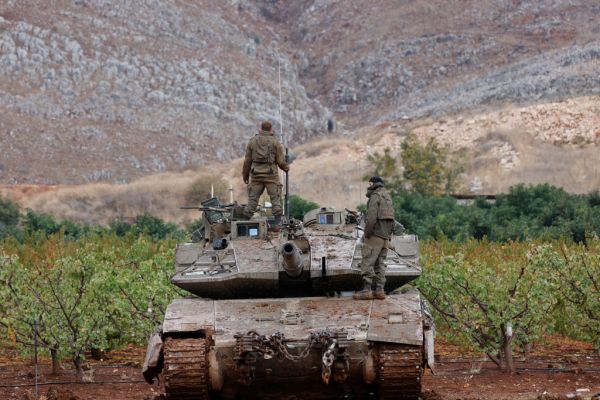Happy Tuesday! Five zebras, four camels, and a miniature horse were rescued from a burning circus truck in Indiana on Sunday. All of the animals and the vehicle’s driver were uninjured, and, as far as we can tell, this was not a preview of a new death-defying act.
Quick Hits: Today’s Top Stories
- The United States and United Kingdom on Monday announced sanctions targeting a network of individuals, led by Iranian narcotics trafficker Naji Ibrahim Sharifi-Zindashti, that plotted to assassinate Iranian dissidents at the direction of Iran’s Ministry of Intelligence and Security. The sanctions followed indictments that charged Zindashti with hiring two Canadian hitmen to kill two Iranian refugees living in Maryland, though the plot was never successfully carried out. “The Iranian regime’s continued efforts to target dissidents and activists demonstrate the regime’s deep insecurity and attempt to expand Iran’s domestic repression internationally,” Under Secretary of the Treasury for Terrorism and Financial Intelligence Brian E. Nelson said in a statement released yesterday. The Treasury Department identified multiple assassination plots allegedly led by Zindashti, including the 2017 murder of Saeed Karimian, a British national and owner of Gem TV, which aired content that was critical of the Iranian government.
- Former Finnish Prime Minister Alexander Stubb was projected to narrowly win the first round of the country’s presidential elections on Sunday, setting him up for a runoff election against Pekka Haavisto, a former foreign minister, on February 11. Both Stubb and Haavisto have promised to take a hard line against Russia in the first election since Finland became a NATO member in 2023.
- The U.S. on Monday began to reinstate sanctions on Venezuela in response to President Nicholas Maduro’s continued ban on leading opposition candidate Maria Corina Machado from running for president. The sanctions announced last night require U.S. companies to end transactions with Minerven, a Venezuelan state-owned gold mining company, by February 13, and the Biden administration has suggested that it would allow a Treasury deal permitting trade with Venezuelan oil companies to expire in April unless Machado is allowed to run.
- U.S. military officials told the Wall Street Journal on Monday that confusion over a returning U.S. drone caused the failure to stop Sunday’s attack on a military outpost in Jordan that killed three U.S. service members and injured at least 40 more. The enemy drone, which was launched from Iraq by Iranian-backed militants, was reportedly mistaken for the friendly surveillance drone as it approached the base at the same time the U.S. craft was also returning to base. The Department of Defense identified the three fallen soldiers on Monday: Sgt. William Jerome Rivers of Willingboro, New Jersey; Spc. Kennedy Ladon Sanders of Waycross, Georgia; and Spc. Breonna Alexsondria Moffett of Savannah, Georgia.
- The U.S. Department of Energy (DOE) finalized new energy efficiency standards for household cooking products on Monday that, among other inclusions, allow gas stoves to keep high-powered burners. The new rules impact appliances built in 2028 or after, and DOE estimated that “approximately 97 percent of gas stove models and 77 percent of smooth electric stove models on the market already meet” the new standards.
A Matter of Time

In the wake of the October 17 explosion at the Al-Ahli Arab Hospital in Gaza—and widespread misreporting on what occurred—U.S. troops stationed in Iraq and Syria began facing near-daily drone, rocket, mortar, and missile attacks launched by various Iranian-backed militia groups.
On October 25, for example, American forces stationed at Al-Asad Air Base in Western Iraq were targeted in a drone attack—one drone, laden with explosives, struck a barracks but didn’t explode. Had it detonated, Americans likely would have been killed. On Christmas Day, an attack on Erbil Air Base injured three service members, with one soldier suffering a “devastating neurological injury” and needing to be put in a medically-induced coma after shrapnel from a drone struck his head. Four U.S. troops suffered traumatic brain injuries on January 20 after a ballistic missile strike on Al-Asad Air Base.
There have been 165 such attacks since October—and at that rate, it was a matter of when, not if, U.S. forces would suffer fatalities. It happened over the weekend, when three American soldiers were killed in an attack on a military outpost in northeast Jordan, near the Syrian border. With previous retaliatory strikes failing to stem the tide of attacks, the Biden administration is now weighing how the U.S. will respond to the loss of American lives.
Early on Sunday, an Iranian-backed militia operating out of Iraq attacked a logistics support base in Jordan known as Tower 22. The strike, which U.S. officials have reportedly assessed was carried out using an Iranian-made Shahed drone, left three dead and more than 40 injured—with three of the injured needing to be evacuated to the army’s Landstuhl Regional Medical Center in Germany for additional care. Approximately 350 American personnel are located at Tower 22, which has supported the U.S. mission to combat ISIS in the region. Early reports suggest the enemy drone that struck the base approached at the same time an American surveillance drone was returning, leading to confusion.
“The three American service members we lost were patriots in the highest sense,” President Joe Biden said yesterday in a statement. “Have no doubt—we will hold all those responsible to account at a time and in a manner [of] our choosing.”
The Islamic Resistance in Iraq—an umbrella group of Iran-affiliated militias—has claimed responsibility for the attack. The Defense Department has yet to publicly identify the specific group that launched the drone, but officials are placing the ultimate blame on Iran given the aid, coordination, and direction the country provides to militant groups in Iraq and Syria. “In terms of attribution for the attack, we know this is an [Islamic Revolutionary Guard Corps]-backed militia,” Sabrina Singh, a Pentagon spokesperson, said during a briefing yesterday. “It has the footprints of Kataib Hezbollah. But not making a final assessment on that, our teams here are continuing to do the analysis. We know that Iran is behind it.” Officials have not stated publicly that Iran explicitly directed the attack, and a spokesperson for Iran’s foreign ministry denied any involvement in the strike.
Kataib Hezbollah is part of the Islamic Resistance and has been responsible for multiple attacks on U.S. troops in recent months. Last week, U.S. forces conducted airstrikes against Kataib Hezbollah facilities in Iraq, reportedly killing several members of the group. Since October, the Biden administration has carried out a series of what it’s labeled “self-defense strikes” in Iraq and Syria, targeting militia leaders and facilities used by Iran’s Islamic Revolutionary Guards Corps (IRGC) and its local proxy groups.
The response thus far has obviously failed to deter threats to U.S. forces in the region. Defense officials declined to comment on exactly what will happen next now that American service members have been killed, but emphasized that the U.S. doesn’t want to escalate the conflict. “We do not seek another war,” National Security Council spokesperson John Kirby said yesterday. “We do not seek to escalate, but we will absolutely do what is required to protect ourselves.” Defense Secretary Lloyd Austin—just released from the hospital on Monday—affirmed that the U.S. would protect U.S. troops. “The President and I will not tolerate attacks on American forces, and we will take all necessary actions to defend the United States, our troops, and our interests,” he said in a statement Sunday. The comments, however, were remarkably similar to something Austin said in November: “These attacks must stop, and if they don’t stop, then we won’t hesitate to do what’s necessary … to protect our troops.”
Dozens of attacks later, the administration is stuck between wanting to deter future attacks while avoiding a broader conflict with Iran. “That’s the hard part of it,” Kirby said of the challenge of balancing deterrence and deescalation. “There’s no easy answer here.”
Yet some analysts argue the lack of a more forceful U.S. response at the outset of these attacks has created the current predicament. “We have seen that American caution has not led to de-escalation,” Matthew Kroenig and Jeffrey Cimmino argued in a piece for The Dispatch earlier this month. “Rather, American weakness has encouraged more aggression.” Kroenig—the vice president and senior director of the Atlantic Council’s Scowcroft Center for Strategy and Security who previously worked on Iran policy at the Defense Department—said after the latest attack that the United States needs to go after Iran directly to reinstate deterrence, either sinking an Iranian naval ship, targeting Iranian leadership, or degrading Iran’s nuclear program.
“Another surgical strike directly against the proxies involved would be a mistake,” he suggested. “It would be read in Tehran as a sign of weakness and simply stoke a continued cycle of violence.”
Republican lawmakers have criticized the administration’s handling of the strikes. “The cost of failure to deter America’s adversaries was again measured in American lives,” said Senate Minority Leader Mitch McConnell. “We cannot afford to keep responding to this violent aggression with hesitation and half-measures.” Some more hawkish senators are calling for the U.S. to take the fight directly to Tehran. Republican Sen. Lindsey Graham of South Carolina, for example, believes we need to “hit Iran now.” GOP Sens. Roger Wicker of Mississippi, John Cornyn of Texas, and Tom Cotton of Arkansas have all called for strikes inside Iran, arguing the administration’s strategy thus far has amounted to failed appeasement.
A more forceful U.S. response is likely in the coming days, but it remains to be seen whether the White House will opt for strikes against Iranian proxy groups or go after Iranian military assets more directly. Some observers argue the former approach is unlikely to change the behavior of the militia groups, whose long-term goal, like Iran’s, is to see American forces driven out of the region entirely. “The argument that ‘if we bomb them enough they’ll stop,’ to me doesn’t seem like the way to solve this problem, because these groups don’t respond to those kinds of deterrence signals,” Greg Brew, an analyst for the Eurasia Group who focuses on Iran, told TMD. “The militias involved, Kataib Hezbollah and others, are large enough, capable enough, and entrenched enough in Iraq that they feel that they can absorb the practical amount of U.S. military retaliation. … They know that the U.S. does not have the stomach for another large military intervention in the Middle East or in Iraq.”
The Biden administration’s reluctance to retaliate more aggressively up to this point suggests strikes on targets in Iran are likely off the table going forward. Democratic lawmakers have condemned the attack as an escalation, but have emphasized the need for caution. “I support President Biden in a deliberate and proportionate response,” said Sen. Ben Cardin, a Democrat who chairs the Senate Foreign Relations Committee. Senate Armed Services Committee Chair Jack Reed echoed those comments.
Critics of Biden’s response to the attacks argue there are assets outside of Iran that, if targeted by the U.S., could possibly drive Iran to lean on its proxies to stop the strikes on American troops. “There are a lot of things that we can do short of military action inside of Iran that would really throw the regime back on its heels so long as there’s also a quiet message passed saying ‘Our target list includes other things inside of Iran too,’” said Rich Goldberg, a senior adviser at the Foundation for Defense of Democracies who previously served as the White House National Security Council’s director for countering Iranian weapons of mass destruction. Goldberg believes that the U.S. could target Iran’s IRGC leaders in Iraq and Syria, or Iranian naval vessels in the Red Sea that are likely supporting the Houthi rebels in their attacks on commercial shipping.
The Biden administration’s current strategy hasn’t deterred Iran’s aggression, but Goldberg argued that striking higher-value Iranian targets could ensure Tehran gets the message. “To the extent that there are senior IRGC commanders that we can target, we should take them out,” he told TMD. The 2020 strike that killed IRGC Quds Force leader Qassem Suleimani while he was traveling in Iraq also killed the then-leader of Kataib Hezbollah, which sent a powerful message of deterrence but did not ultimately lead to a broader conflict with Iran. “I think President Biden needs a Suleimani moment,” Goldberg said.
Worth Your Time
- In the 1940s, beavers—then considered a nuisance—were parachuted out of planes into remote locations to evict them from ranch communities. Today, humans are still rehoming beavers, albeit in much different ways and for much different reasons. Writing for Atlas Obscura, Danielle Hallock chronicles the long and fascinating history of beaver relocation, revealing that the animal’s ecological impacts can even be seen from space. “NASA’s network of satellites take images of the surface regularly, and in some places their photographic records go back decades,” she wrote. “NASA analysts can see the impact of all those beavers that were parachuted around Idaho in the 1940s. Shortly after that operation, something remarkable happened to those remote locations. Baugh Creek, which received many animal packages from the sky, became so lush and verdant that the greenery clearly stood out from space. A 2018 wildfire torched the surrounding land, but Baugh Creek’s beaver-rich ‘emerald refuge’ resisted the blaze.”
Presented Without Comment
National Security Adviser Jake Sullivan, September 29, 2023: “The Middle East region is quieter today than it has been in two decades.”
Secretary of State Antony Blinken, January 29, 2024: “This is an incredibly volatile time in the Middle East. I would argue that we’ve not seen a situation as dangerous as the one we’re facing now across the region since at least 1973, and arguably even before that.”
Also Presented Without Comment
Independent presidential candidate Robert F. Kennedy Jr. told NewsNation that former President Donald Trump’s team reached out to ask about serving as Trump’s VP.
“I would not take that job,” Kennedy said. “And I’m flattered that President Trump would offer it to me, but it’s not something that I’m interested in.”
Toeing the Company Line
- In the newsletters: Kevin explained the problem (🔒) with “monetizing the debt,” the Dispatch Politics crew checked in on the No Labels super PAC, and Nick compared (🔒) former Gov. Nikki Haley’s Trump truth telling to that of former Republican Rep. Liz Cheney.
- On the podcasts: Sarah and David dive deep into the state of immigration law on the latest Advisory Opinions, weighing in on Texas Gov. Greg Abbott’s legal battle with the Biden administration.
- On the site today: Patrick T. Brown offers a defense of lawmakers’ new child tax credit proposal, and Chris Stirewalt writes on the history of natural gas politics.
Let Us Know
When it comes to Iran, are you more concerned the U.S. won’t respond forcefully enough putting additional service members at risk or will respond too forcefully and trigger a broader conflict?









Please note that we at The Dispatch hold ourselves, our work, and our commenters to a higher standard than other places on the internet. We welcome comments that foster genuine debate or discussion—including comments critical of us or our work—but responses that include ad hominem attacks on fellow Dispatch members or are intended to stoke fear and anger may be moderated.
You are currently using a limited time guest pass and do not have access to commenting. Consider subscribing to join the conversation.
With your membership, you only have the ability to comment on The Morning Dispatch articles. Consider upgrading to join the conversation everywhere.